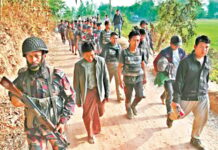By JIM YARDLEY

NEW DELHI — Tens of thousands of people resumed mass demonstrations in Bangladesh’s capital on Saturday, intensifying their demands for more severe punishment for war criminals from the country’s 1971 liberation war, while also demanding justice for the slaying of a blogger who had been a leading organizer of the protests.
The coffin bearing the body of Rajib Haider, an architect and blogger, was carried through the crowd in a public funeral at Shahbagh, a major intersection in Dhaka, the national capital. Bangladeshi television showed thousands of people kneeling in prayer, chanting slogans or waving banners bearing Mr. Haider’s image. The crowd were estimated at more than 100,000 people.
Prime Minister Sheikh Hasina visited Mr. Haider’s family on Saturday to express her condolences. Mr. Haider’s body was discovered Friday night near his home, after he had been savagely stabbed. His family has told the Bangladeshi news media that they believed that he was killed for his role in the protests and his outspoken criticism of the fundamentalist Islamist political party Jamaat-e-Islami.
“Haider’s killing occurred at a time when the youngsters have awakened and united the whole nation,” the prime minister told Bangladeshi reporters during her visit to the family’s home. “Let me promise that we will not spare the killers.”
Saturday was the 12th consecutive day in which crowds of protesters have poured into the Shahbagh site for demonstrations. The movement began Feb. 5, when a coalition of bloggers called for protests against a verdict by the special tribunal prosecuting people accused of committing atrocities during Bangladesh’s 1971 war of independence from Pakistan.
The tribunal had handed down a life sentence to Abdul Quader Mollah, a Jamaat leader, after convicting him of murder, rape and torture. Protesters, however, demanded that he be sentenced to death, given the severity of his crimes. Many suspected that some sort of political deal had been reached to spare Mr. Mollah’s life.
The bloody legacy of the 1971 war continues to cast a shadow over Bangladesh: an estimated three million people were killed and many of those suspected of committing atrocities have never been prosecuted. Besides the protests in Dhaka, demonstrations have spread to other major cities and towns across the country.
By the weekend, protest organizers had agreed to reduce their round-the-clock demonstrations to only seven hours a day. But they reversed that decision after the killing of Mr. Haider, and the crowds quickly swelled with college students, workers and other citizens.
Meanwhile, followers of Jamaat-e-Islami have staged often violent protests against the government, which the party has accused of manipulating the tribunal as a way to go after political rivals.
The presiding justice of the tribunal has resigned over irregularities that arose over its proceedings.
Source: New York Times









